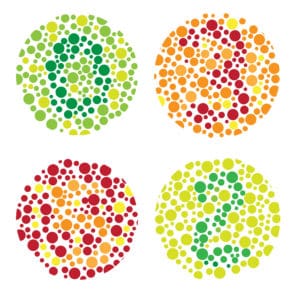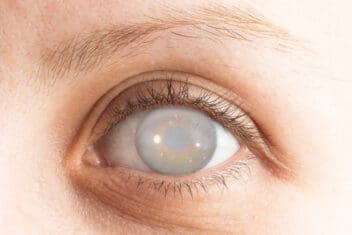
Medically Reviewed by Tom Tooma, M.D., Founder/Medical Director NVISION Surgeon
Does Laser Eye Surgery Fix Color Blindness?
Home / Laser Eye Surgery Guide (Updated) /
Last Updated:

Medically Reviewed by Tom Tooma, M.D., Founder/Medical Director NVISION Surgeon
Color blindness is a rare condition that affects a very small percentage of the population. People with color vision deficiencies mostly likely inherited the condition, though there are certain medical situations that can lead to varying degrees of color blindness.
Table of Contents
While the causes of color blindness are fairly well understood, there are not yet any identified cures for the condition. Inherited color blindness is considered to be incurable, but there are many corrective techniques and products available to help people work around their color vision deficiencies.
One of the most effective products available for people with color blindness are color blind lenses and glasses. While these lenses primarily only help people with red-green color blindness, they can make a significant impact on people’s ability to see colors more vividly and accurately.

Many people wonder if laser eye surgery is an effective treatment for color blindness, but it is unfortunately not an effective intervention for the condition. Laser eye surgery is able to make physical changes to the cornea, a part of the eye that is not related to color vision deficiencies.
While there are no surgical interventions or other cures known at this point for color blindness, research continues to explore possible solutions to this primarily inherited condition.
What Is Color Blindness?
Color blindness, which is more properly referred to as color vision deficiency, describes a variety of problems people experience with color vision. Some people struggle to tell the difference between shades of a color, such as red and green, while others are not able to see color at all.
According to Prevent Blindness America, males are more likely than females to experience color blindness. Approximately 8 percent of males and 1 percent of females have problems with their color vision.
You deserve clear vision. We can help.
With 135+ locations and over 2.5 million procedures performed, our board-certified eye surgeons deliver results you can trust.
Your journey to better vision starts here.
Signs of color blindness include:
- Difficulty telling colors apart.
- People informing you that you are seeing the wrong color.
- Certain colors appearing faded.
- Seeing a limited range of colors.
Someone experiencing color blindness is not able to process various wavelengths of light properly that normally indicate specific colors. Rods and cones in the eye are responsible for proper vision. Someone with a deficiency of cones is likely to experience problems with color vision.
Causes, Cures & Corrections for Colorblindness
Color blindness is an inherited condition and almost always present at birth in someone who has it. It is also possible, however, to develop symptoms of color blindness as you get older.
Color vision deficiency can happen when the lenses in your eyes become darker and more yellow over time. This can cause older people to have difficulty perceiving dark colors. In addition, certain eye diseases and medications can alter your color vision.

Certain medical conditions can lead to color blindness.
- Neurodegenerative Diseases
- Cataracts
- Macular Degeneration
- Certain Medications
- Optic Neuropathies
Currently, there are no cures for hereditary color blindness. Certain corrections, however, are available that can help you work with your color vision deficiencies.
Learning to recognize colors with different techniques, such as location or brightness is one way keep your colors straight. Additionally, specially tinted eye glasses are available that are able to help you tell certain colors apart.
Lenses That Can Help With Color Blindness

Special lenses have been developed to help people with certain color vision deficiencies. According to the National Eye Institute, people with red-green color blindness may be helped by the use of special lenses, or filters, to help see these colors more accurately. The lenses are only designed to work outside in bright lighting, however, so their use is somewhat limited.
While the use for these lenses may appear to be narrow, red-green color blindness is the most common form of color vision deficiency. The majority of people affected by the condition could benefit from the use of such lenses.
Recently, companies have been honing the effectiveness of color blind glasses. These glasses use specially tinted lenses to make colors appear more vividly and accurately for people with color vision deficiencies. They do not cure color blindness, but they can create a wider spectrum of colors when worn.
The two primary brands of color blind glasses are:
- EnChroma. EnChroma lenses contain optical materials that remove particular wavelengths of light where overlapping occurs to enhance red-green color vision.
- ColorCorrection System. Customized filters designed for each person can be applied to contact lenses and eye glasses.
Makers of colorblind glasses claim them to be highly successful at increasing the array of colors that a colorblind individual can experience. That being said, each person’s color vision deficiencies vary slightly, and the glasses may not be entirely effective for everyone.
Additionally, with price tags ranging from $300 to $600, you’ll want to sample these glasses before investing in a new pair.
You deserve clear vision. We can help.
With 135+ locations and over 2.5 million procedures performed, our board-certified eye surgeons deliver results you can trust.
Your journey to better vision starts here.
Laser Eye Surgery for Color Blindness
As of yet, there are no cures or medical interventions available for inherited color blindness, which includes laser eye surgery.
Most people who experience varying degrees of color blindness are able to adapt to their condition via effective coping methods without it having a significant impact on their daily lives. Utilizing techniques, such as memorizing the order of the colors of a traffic light, wearing colorblind glasses, or having color-assisting apps on your phone or tablet, are enough to work around problems caused by color vision deficiencies.
Laser eye surgery is intended for people experiencing vision problems due to misshapen corneas that are causing focusing issues. All types of laser eye surgery are meant to reduce dependency on glasses or contact lenses, but not all vision problems can be fixed with laser eye surgery.
LASIK is one of the most common types of laser eye surgery. It has been developed to help people with nearsightedness, farsightedness, and presbyopia, a natural condition that occurs as you age. With LASIK, lasers are used to permanently reshape the cornea of the eye so it can properly focus on objects both near and far.
Since the cause of color blindness is due to cones in the eye that don’t discriminate wavelengths of color properly, laser surgery isn’t helpful. Laser surgery only reaches as far as the cornea of the eye, not the rods and cones behind it.
Research for a Cure
Scientists around the world are working on developing a cure for color blindness. Promising studies are being conducted on treating inherited color blindness via gene therapy. As the most common type of color vision deficiency, red-green color blindness is the primary target of the studies, which are still a couple years away from being safely and effectively tested on humans.
In the meantime, people who experience color vision deficiencies will have to rely on adaptive techniques, specialty lenses and glasses, and sophisticated apps to improve the depth of their color perception abilities.
You deserve clear vision. We can help.
With 135+ locations and over 2.5 million procedures performed, our board-certified eye surgeons deliver results you can trust.
Your journey to better vision starts here.
References
- Causes of Colour Blindness. Colour Blind Awareness.
- Color Blindness. (January 2018). All About Vision.
- Color Blindness Treatment. (May 2016). Everyday Health.
- Color Vision Deficiency. (2019). Prevent Blindness America.
- Facts About Color Blindness. (February 2015). National Eye Institute.
- LASIK. (March 2018). U.S. Food & Drug Administration.

Dr. Tooma, the founder of NVISION® Eye Centers, has performed well over 130,000 LASIK surgeries, making him the most experienced LASIK surgeon in the Western United States.
This content is for informational purposes only. It may have been reviewed by a licensed physician, but is not intended to serve as a substitute for professional medical advice. Always consult your healthcare provider with any health concerns. For more, read our Privacy Policy and Editorial Policy.

